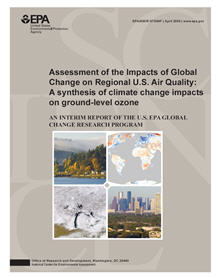Assessment of the Impacts of Global Change on Regional U.S. Air Quality: A Synthesis of Climate Change Impacts on Ground-Level Ozone (An Interim Report of the U.S. EPA Global Change Research Program)
Alert
Notice
EPA is announcing the release of the final report, Assessment of the Impacts of Global Change on Regional U.S. Air Quality: A Synthesis of Climate Change Impacts on Ground-Level Ozone (An Interim Report of the U.S. EPA Global Change Research Program), prepared by the Global Change Research Program Staff in the National Center for Environmental Assessment (NCEA) of the Office of Research and Development (ORD) at the U.S. Environmental Protection Agency (EPA).
Abstract
The Air Quality Assessment Final Report is intended for managers and scientists working on air quality to provide them with information on the potential effects of climate change on regional air quality in the United States. The earth’s climate governs several of the natural processes that influence air quality. Climate change, along with other aspects of global change, including changes in population, land use and the technologies employed for energy production and transportation, may alter the capacity for US states to successfully attain the national air quality standards in the future. In 2000, the US EPA ORD Global Change Research Program (GCRP) initiated a research and assessment program devoted to the evaluation of the potential impact of global change on US air quality. The overall design of the research and assessment program benefitted from input provided by the EPA Office of Air and Radiation, several EPA Regional offices, and the climate change research community.
The EPA GCRP air quality research and assessment program is analyzing the complex role of global change processes in US air quality in two phases. The major effort undertaken in Phase 1 included the development of modeling tools that:
The earth’s climate governs several of the natural processes that influence air quality. Climate change, along with other aspects of global change, including changes in population, land use and the technologies employed for energy production and transportation, may alter the capacity for US states to successfully attain the national air quality standards in the future. In 2000, the US EPA ORD Global Change Research Program (GCRP) initiated a research and assessment program devoted to the evaluation of the potential impact of global change on US air quality. The overall design of the research and assessment program benefitted from input provided by the EPA Office of Air and Radiation, several EPA Regional offices, and the climate change research community.
The EPA GCRP air quality research and assessment program is analyzing the complex role of global change processes in US air quality in two phases. The major effort undertaken in Phase 1 included the development of modeling tools that: - incorporate the physical and chemical links between global- and regional-scale meteorological processes to project future regional air quality, and;
- account for changes in energy and transportation technologies in future air quality-related emissions.
Impact/Purpose
This interim report is intended for managers and scientists working on air quality to provide them with information on the potential effects of climate change on regional air quality in the United States.Status
This is the final report.Citation
U.S. EPA. Assessment of the Impacts of Global Change on Regional U.S. Air Quality: A Synthesis of Climate Change Impacts on Ground-Level Ozone (An Interim Report of the U.S. EPA Global Change Research Program). U.S. Environmental Protection Agency, Washington, DC, EPA/600/R-07/094F, 2009.History/Chronology
| Date | Description |
|---|---|
| 01- Jun 2007 | NCEA completes the first draft interim assessment report, with support of NRMRL, NCER and NERL. |
| 02- Jul 2007 | NCEA releases the draft report for internal review. |
| 03- Sep 2007 | EPA releases the ORD/NERL Air Quality Modeling report. |
| 04- Jul 2008 | EPA releases the draft interim air quality assessment report for external peer review and public comment. |
| 05- Apr 2009 | EPA releases the final interim air quality assessment report. |
Download(s)
This document has been reviewed in accordance with U.S. Environmental Protection Agency policy and approved for publication. Mention of trade names or commercial products does not constitute endorsement or recommendation for use.
- 1. Assessment of the Impacts of Global Change on Regional U.S. Air Quality (GCAQ): A Synthesis of Climate Change Impacts on Ground-Level Ozone (PDF) (131 pp, 6.9 MB, about PDF)
- 2. GCAQ Final Report: Appendices (PDF) (82 pp, 659.2 KB, about PDF)
- 3. Regional Air Quality Report Fact Sheet (PDF) (2 pp, 149.4 KB, about PDF)
